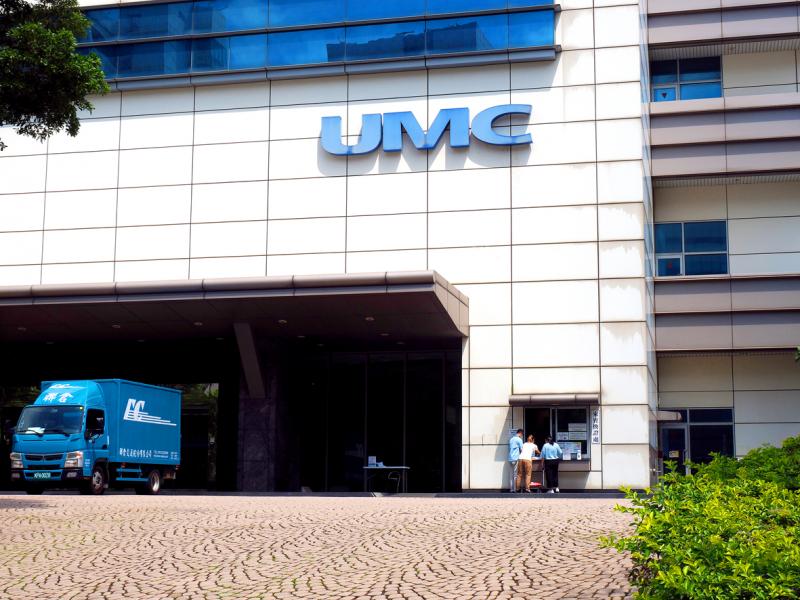United Microelectronics Co (UMC, 聯電) is expected to overtake GlobalFoundries Inc as the world’s third-largest foundry this quarter, as strong demand for display driver and power management chips is estimated to help drive its revenue up 13 percent, market researcher TrendForce Corp (集邦科技) said yesterday.
UMC would see its revenue expand to US$1.57 billion this quarter from a year earlier, with a global market share of 6.9 percent, compared with GlobalFoundries’ estimated revenue of US$1.49 billion, with a market share of 6.6 percent, the Taipei-based researcher said.
TrendForce attributed the growth to rising customer orders for display driver, power management and Internet of Things chips.

Photo: David Chang, EPA-EFE
That would boost the utilization rate at UMC’s 8-inch factories and its chip prices, as well as its shipments of 28-nanometer chips, TrendForce said.
GlobalFoundries is streamlining its factory operations, after selling an 8-inch fab in Singapore to Taiwan’s Vanguard International Semiconductor Corp (世界先進) at the end of last year for US$236 million.
Taiwan Semiconductor Manufacturing Co (台積電) is expected to retain its top position, with revenue forecast to surge 21 percent year-on-year to US$12.55 billion this quarter and a market share of 55.6 percent.
Samsung Electronics Co would rank fourth, with revenue likely to expand 16.4 percent to US$3.72 billion and a 16.4 percent market share, TrendForce said.
Semiconductor Manufacturing International Corp (SMIC, 中芯國際), the biggest chipmaker in China, would rank fifth, with a market share of 4.3 percent, as its revenue is predicted to grow 15 percent to US$963 million this quarter, benefiting from rising demand for radio frequency and power management chips, TrendForce said.
However, SMIC’s revenue this quarter would decline 11 percent quarter-on-quarter, as it was forced to stop shipping chips to HiSilicon Technologies Co (海思), the chip designing arm of Huawei Technologies Co (華為), from Sept. 14.
SMIC was also added to a US blacklist due to its ties with the Chinese military.
Tower Semiconductor Ltd, which sells chips under the Tower Jazz brand, seized the sixth spot with revenue of US$340 million, up 11 percent from a year earlier. The Israeli company is expected to have a market share of 1.5 percent this quarter.
Taiwan’s Powerchip Semiconductor Manufacturing Co (力積電) and Vanguard ranked seventh and eighth, with revenue growing 28 percent and 24 percent to US$312 million and US$297 million respectively this quarter, TrendForce said.
The two firms would have market shares of 1.4 percent and 1.3 percent respectively, it said.

Taiwanese suppliers to Taiwan Semiconductor Manufacturing Co. (TSMC, 台積電) are expected to follow the contract chipmaker’s step to invest in the US, but their relocation may be seven to eight years away, Minister of Economic Affairs J.W. Kuo (郭智輝) said yesterday. When asked by opposition Chinese Nationalist Party (KMT) Legislator Niu Hsu-ting (牛煦庭) in the legislature about growing concerns that TSMC’s huge investments in the US will prompt its suppliers to follow suit, Kuo said based on the chipmaker’s current limited production volume, it is unlikely to lead its supply chain to go there for now. “Unless TSMC completes its planned six

Intel Corp has named Tasha Chuang (莊蓓瑜) to lead Intel Taiwan in a bid to reinforce relations between the company and its Taiwanese partners. The appointment of Chuang as general manager for Intel Taiwan takes effect on Thursday, the firm said in a statement yesterday. Chuang is to lead her team in Taiwan to pursue product development and sales growth in an effort to reinforce the company’s ties with its partners and clients, Intel said. Chuang was previously in charge of managing Intel’s ties with leading Taiwanese PC brand Asustek Computer Inc (華碩), which included helping Asustek strengthen its global businesses, the company

Power supply and electronic components maker Delta Electronics Inc (台達電) yesterday said second-quarter revenue is expected to surpass the first quarter, which rose 30 percent year-on-year to NT$118.92 billion (US$3.71 billion). Revenue this quarter is likely to grow, as US clients have front-loaded orders ahead of US President Donald Trump’s planned tariffs on Taiwanese goods, Delta chairman Ping Cheng (鄭平) said at an earnings conference in Taipei, referring to the 90-day pause in tariff implementation Trump announced on April 9. While situations in the third and fourth quarters remain unclear, “We will not halt our long-term deployments and do not plan to

The New Taiwan dollar and Taiwanese stocks surged on signs that trade tensions between the world’s top two economies might start easing and as US tech earnings boosted the outlook of the nation’s semiconductor exports. The NT dollar strengthened as much as 3.8 percent versus the US dollar to 30.815, the biggest intraday gain since January 2011, closing at NT$31.064. The benchmark TAIEX jumped 2.73 percent to outperform the region’s equity gauges. Outlook for global trade improved after China said it is assessing possible trade talks with the US, providing a boost for the nation’s currency and shares. As the NT dollar